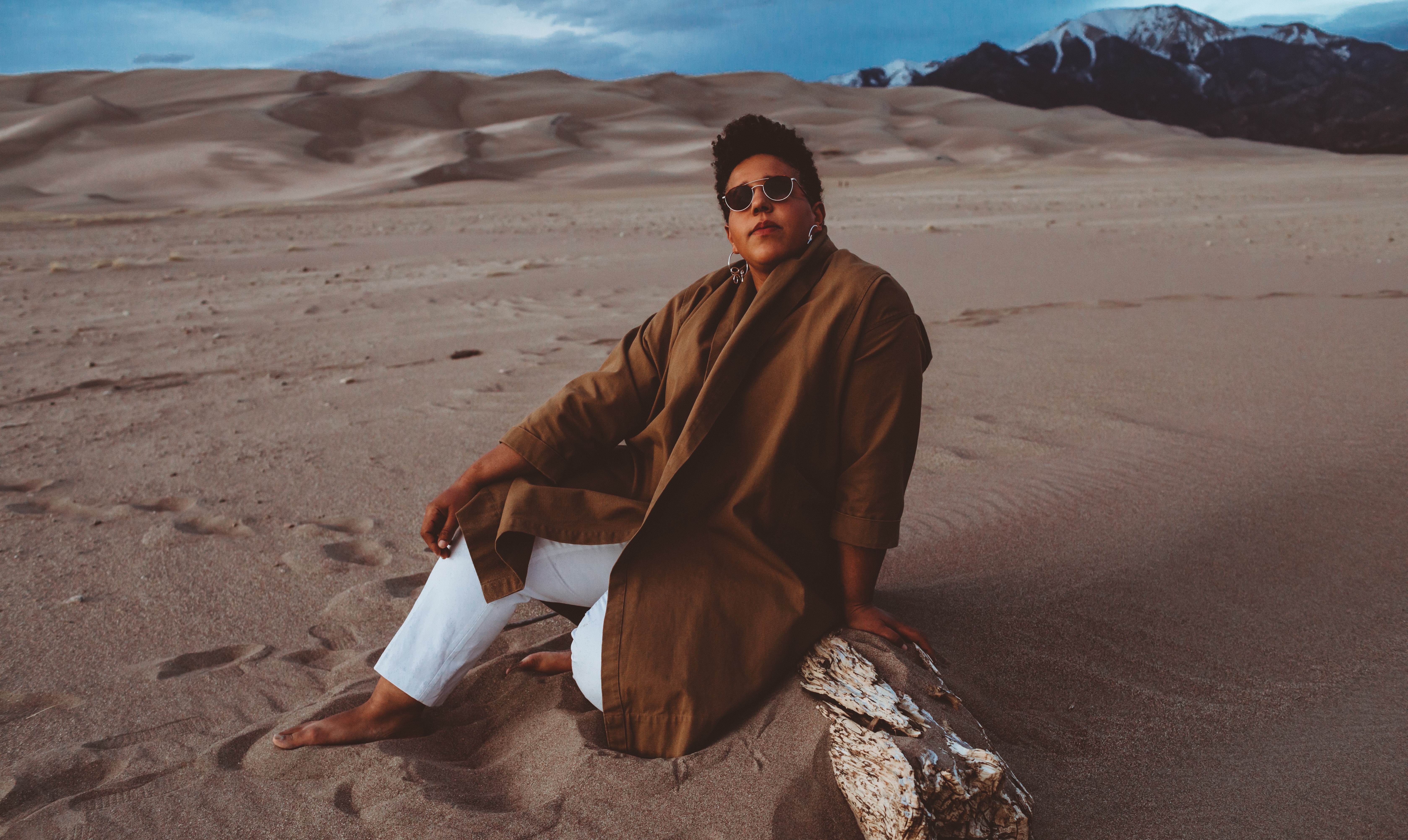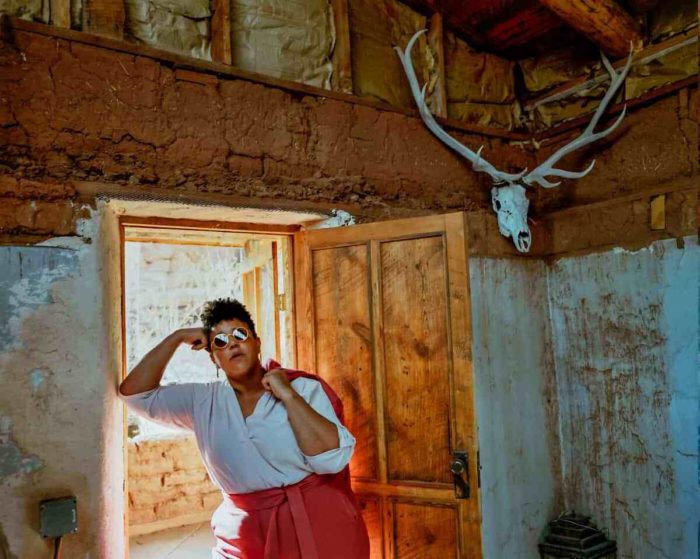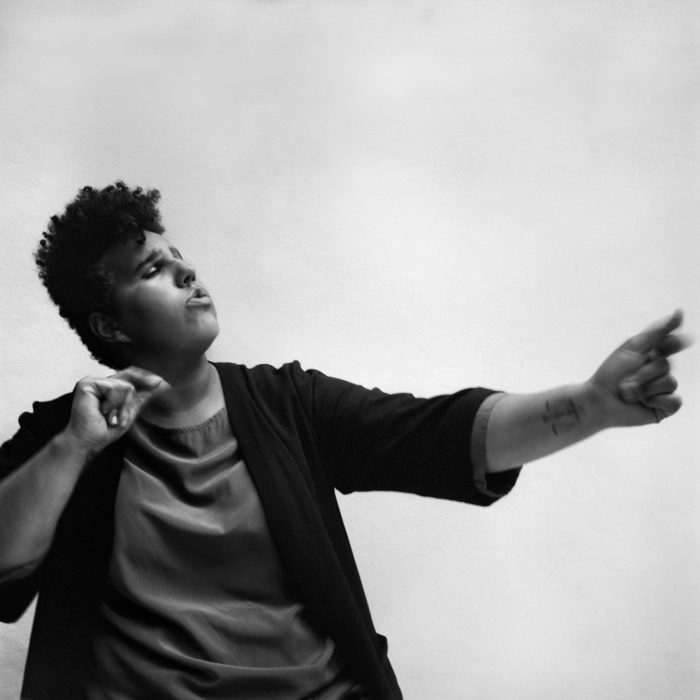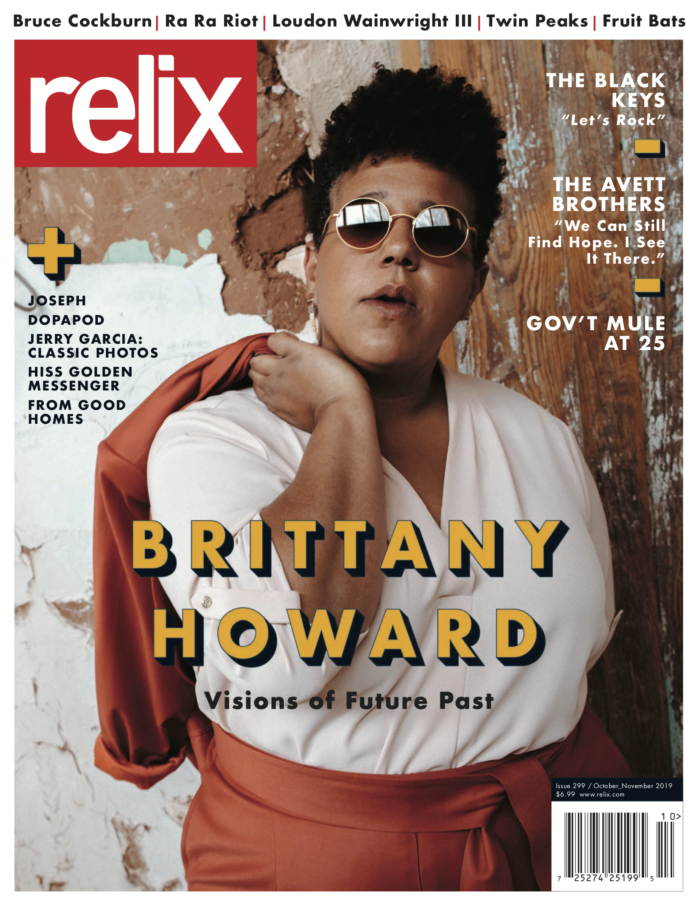Brittany Howard: History Repeats

photo by Brantley Gutierrez
This article originally appears as the cover story in the current October/November 2019 issue of Relix. Subscribe here with code BRITTANY before Oct. 28 to get $5 off and receive this issue as your first.
Alabama Shakes’ genre-defying frontwoman Brittany Howard steps away from her band for a deeply personal solo turn unlike anything else in her already singular career.
“That’s scary, but don’t worry,” a tarot card reader says. “The devil is kind of weirdly positive, though it looks crazy.” Brittany Howard gasps when the Beelzebub card is revealed—but, hey, this was her idea. It’s a sweltering summer day on Manhattan’s Lower East Side; we’re at a new outpost of the swanky private club Soho House, not a dingy storefront, and our reader is a young Jewish make-up artist in a Queen T-shirt instead of a wizened old lady. Still, you mess with the underworld at your own risk.
I was willing to go first, and the cards offered me insights both encouraging (things look promising for my son’s college applications) and obvious (our family cat “either withholds love or gives you a lot”—isn’t that just called “being a cat?”).
When Howard’s turn comes, the news is all good. “I see a lot of fidgety energy in September,” says the medium. “You’ll be having to travel a lot and juggle a lot of things.”
Well, yes. September would see the release of Howard’s debut solo album—the thrilling, sprawling Jaime, which marks a bold step away from her platinum-selling, Grammy-winning band, Alabama Shakes. Let the traveling and juggling begin.
Howard gets more interested when the deck indicates that she will be making a “deeper connection” with someone close to her. “This could be your dad,” says the reader. “You getting closer with your dad or learning new things. There will be a lot of healing in the way you will communicate going forward, starting to see him in a different light, and it could change the way that he treats you.”
In fact, Howard notes afterward: “Me and my dad haven’t been close in a really long time, but now he’s coming around more.” She believes that the personal and emotional subjects she tackles on Jaime—racism, sexuality, spirituality—might have helped him open up to her more about their experiences as a poor, bi-racial family in the South.
“Maybe because I’ve been so honest and because I’ve been talking about it more, he feels like, ‘Oh, I can talk about it, too,’” she says. “I feel like he was holding back a lot of his emotions about what our family went through, just so I wouldn’t feel them.”
Her parents both attended her performance at Nashville’s historic Ryman Auditorium, a high-profile show where she pulled off the risky move of exclusively playing new material more than a month before her album’s release. “My dad was so proud,” she says. “He always has this T-shirt over his shoulder, and he was swinging it above his head, egging on the crowd. My mom and I have very different political stances—me feeling very much like inclusion is love and divisiveness is obviously not—so I wondered how she was going to take the show, but she loved it, too.”
Her parents’ response is especially important to Howard because the very title of the album comes from her own flesh and blood. Jaime was her older sister, who died from retinoblastoma, a rare form of eye cancer, at the age of 13. (Howard suffered from the same affliction but survived with partial blindness in one eye.) The singer insists, though, that while the title is obviously a tribute to her sister, using the name was ultimately about herself.
“This record’s about me,” she says. “There’s not any songs on there that reference my sister or are really about her. But she taught me how to make music, how to be creative, how to use my imagination from a very young age. She’s four years older than me, so from when I was born, she was like, ‘Oh, let me show you how to have fun in this place.’ Because we didn’t have any money—we were in a trailer in a junkyard, with animals—she was like, ‘Go in the yard.’ We’d imagine or write songs or draw, so that informed me. Everything I like is because my sister taught it to me.
“And when she passed away,” Howard continues, “it was kinda like ‘OK, now use all the things I taught you.’ So I feel like it’s only appropriate that I share this with her and have her name on it. Because, yeah, it’s my solo record—but it’s also our solo record, in a way.”

Alabama Shakes are one of those miraculous bands that seemed to arrive suddenly, inevitably, fully formed. The four members had met as teenagers, and it felt like they were completely ready for the spotlight in July 2011 when the Aquarium Drunkard blog posted an MP3 of their song “You Ain’t Alone” and, the next morning, Howard—then working as a mail carrier—woke up to a barrage of offers from record labels and management companies. It was a dizzying transformation for some small-town Southern kids.
“From our side,” she says, “We were playing all these shows, not getting paid, traveling around not in a van but in separate cars, and saying, ‘If I just play the best I can in front of everybody, then maybe somebody will see us play’—and that’s basically what happened. Somebody saw us play and the rest is history.”
The Boys & Girls album was a Top 10 hit, powered by the single “Hold On,” and the Shakes’ bluesy rock and soul sound earned three Grammy nominations. They toured relentlessly, opening for Jack White and lighting up Bonnaroo and Coachella, and Howard became recognized as one of rock’s brightest rising stars.
“I lived in my dad’s trailer for the first two years, in the back bedroom, because I was touring so much that there was no point in living anywhere,” she says. “After a couple of years, the album cycle was over and I got back home and went, ‘Oh, my God, I wonder if I made any money?’ I hadn’t had time to spend any money. It was crazy—‘Now I can just go to the grocery store, buy groceries and not have to worry about putting anything back?’ It was so different.”
The more expansive, kaleidoscopic Sound & Color followed in 2015, giving the Alabama Shakes their first No. 1 album. This time, they won three Grammys and solidified their place as modern rock standard bearers.
“Brittany has an innate style that permeates everything—her playing, her writing, her singing and also her influences,” says Blake Mills, who was nominated for a Grammy for his production work on Sound & Color. “She’s an avid and inspired listener of all kinds of music, and things may find their way in, but I think that—because her sound and identity are so immovable—the final result is unmistakably a ‘Brittany Howard’ piece.”
“My first time hearing Brittany was on the song ‘Don’t Wanna Fight,’” says the acclaimed jazz pianist Robert Glasper, who was a key collaborator on Jaime. “I could tell then that she was fearless and she didn’t give a damn about what people thought.”
Along the way, Howard also seemed to fill a necessary cultural slot. She became a go-to for significant public musical moments, performing at the Obama White House, appearing onstage with Paul McCartney and inducting Sister Rosetta Tharpe into the Rock and Roll Hall of Fame. As a black woman guitar hero, inarguably progressive and cool but rooted in tradition, she embodies multiple meanings during a fractured time.
“I don’t really think about that,” she says. “I don’t even think about stuff I’ve already done, really—I just keep doing stuff and seeing what happens next. I do still think about going to the White House because it made my dad so happy. I’ve never seen him so happy. It made total sense to me why they came to me for Sister Rosetta Tharpe—I would have been upset if they hadn’t come to me for that! And the Grammys were cool, but what I remember was that my feet hurt because my shoes were a little too small. It’s funny the things you remember from stuff like that.”
But when it came time to work on the band’s next project, Howard found that she was struggling. “Creatively, I wasn’t really receiving anything for the Alabama Shakes,” she says. “When we were trying to get together to rehearse and write, nothing was coming to me. For a year and a half, no songs were being written and it just felt like it wasn’t moving along.”
She was also staring down her 30th birthday and worried about getting too complacent and sticking with the path of least resistance. “So I thought, ‘OK, I’m gonna take a break from all of this.’ And that’s when I started receiving songs that were not Alabama Shakes songs. I thought I’d try to steer solo and see what came to me. What really drove me was following the muse.”
In the interim, she also worked with her side bands, Thunderbitch and Bermuda Triangle, which contributed to her ambitions for the tunes that would become Jaime, along with her certainty that they would require other musicians. “It was pretty obvious, it was just so different,” she says. “When you try to cook a certain recipe, you can’t just throw any old ingredients in it, and for what I was trying to do, it needed different players. I just knew. It wasn’t exactly going to work if I stayed in the same situation.”
She had a bunch of musical bits and scraps of songs squirreled away in her Nashville studio, all given temporary titles because her software required it. One of those recordings was “History Repeats,” a skittery, funky ball of confusion. “I had just made it for fun and I really liked it,” she says, “but I knew there was no way we could perform this—it’s just too far out—so I put it away and didn’t think about it.”
In search of inspiration, Howard drove across the country to Topanga Canyon for a change of scenery. When she eventually went into engineer Shawn Everett’s studio in Los Angeles to record, she only had a handful of finished tunes.
“In my brain, I’m thinking, ‘I didn’t make my deadline, I don’t have a record,’” she says. But, during conversations over lunch with her musicians, crazy coincidences started happening—phrases would come up that reminded her of the songs she had stashed away back in Nashville.
“When you try to cook a certain recipe, you can’t just throw any old ingredients in it and, for what I was trying to do, it needed different players. I just knew. It wasn’t exactly going to work if I stayed in the same situation.”
“We’re talking about politics,” she says, “and somebody says, ‘Yeah, history repeats, don’t it?’ I was like, ‘Oh, my God, I totally forgot about that song!’ That kept happening and, all of a sudden, I had a record. It was divine; it really was divine. How else could I explain that?”
Glasper adds that Howard had a clear sense of what she wanted but still left the door open for her collaborators to explore. “She allowed the musicians to be who they are and wasn’t necessarily forcing anything,” he says. “Leaders that trust their musicians and give them room to be who they are will always be the best leaders.”
Howard says that there was only one song on Jaime that gave her pause, that felt like it might be too personal to expose. When she was a baby, her father woke up one morning to find the family car with its tires slashed and a goat head placed in the back seat. Her parents didn’t tell her about the incident until she was a teenager, but it was perhaps the most violent expression of the hostility her black father and white mother faced.
“I felt like that wasn’t necessarily my story; it was my parents’ story,” she says, “but the way it affected me, I definitely wanted to write about it. ‘Goat Head’ is talking about my juvenile experience growing up in the South and all the things I was learning about, like colors. I was asking these little simple questions—‘What’s cotton?’ and ‘Why are these tomatoes green and these ones red?’ and ‘Why is Jesus white?’ And ‘Why did someone cut off a goat’s head and put it in the back of my dad’s car?’
“When I was writing, it really came out of nowhere—that’s a fucking crazy story. Just to make sure, I went to my mom’s house and I sat down with her and was like, ‘Mom, I need to make sure I got this story right because I think it might accidentally be a big song on this record.’ And she confirmed everything for me—‘Yeah, that’s what went down.’ My little brain never forgot.”
Her father hadn’t heard the song until she played it at the Ryman concert. “I was so nervous, I couldn’t even look at him,” she says. “And he loved the song; he was like, ‘That was a good one; that might be my favorite.’ Really? This doesn’t incite anything painful in you? ‘Nah, I guess not.’”
The song “He Loves Me” tracks her evolution from the religion of her childhood—“I kinda learned that God was trying to send everybody to hell, that if I fuck up, I’m going to burn for eternity”—to reaching a state of peace with her maker. (“I know He still loves me when/ I’m smoking blunts,” she sings.)
“It took a long time for me to find my own relationship with whatever it is—spirituality or whatever,” she says. “But now it’s a big part of my everyday life; it gets me through everything. I wanted to write a song that tells people: Nobody can tell you how to love it, whatever it is, and nobody can tell you how it loves you. It’s really a very personal thing, your relationship with your creator. That’s all the song is about—that you don’t have to be ashamed or be doing something you don’t necessarily believe in, because I also see a lot of people that would claim to be good Christians doing a lot of fucked-up shit.”
While putting together these fragments, figuring out songs in the studio, extending her sound bigger and smaller and noisier and sparer, it didn’t occur to Howard that what she was making was such an intimate statement. “It wasn’t until it was done that I looked back on it and saw, ‘Oh, this is all about me, about my life,’” she says. “I didn’t think of it at the time. It didn’t seem so cohesive; it seemed all over the place. From my point of view, it was just grabbing things and going, ‘I like that.’”
What she discovered that she really liked was working as a leader rather than as part of a band. “It was so much quicker than being in the studio with the Shakes, where everybody has their opinions,” she says. “It’s like four chefs in the kitchen, so it takes a while. This was like, ‘Oh, yeah, that sounds great, stay there.’ And if I don’t like it then, later, I’ll change it. That’s how creativity flows—you don’t want to stop it. I didn’t have to worry about anyone wanting to change or take away or add. It’s just exactly how it needed to be for my vision.”

The 15th annual Afropunk festival at Brooklyn’s Commodore Barry Park, tucked away under the Brooklyn-Queens Expressway, is like a universe unto itself. A celebration of alternative black music and culture, the gathering showcases performers ranging from old souls like Leon Bridges and Gary Clark Jr. to futurists including FKA Twigs and Death Grips. And the crowd is simply magnificent, filled with face paint and green Afro-Puffs and full beards matched with tulle dresses.
Howard takes the stage on Sunday night, as the event is nearing its close. “This is my favorite festival I’ve ever been to!” she exclaims. “The vibe is so good and the people are so beautiful!” She plays through a set made up exclusively of material from Jaime, plus a raucous version of Nina Simone’s interpretation of The Beatles’ “Revolution.”
Dressed in a gold-sequined robe, she only picks up her guitar and shreds a few times, mostly singing without an instrument and conjuring rock-gospel-swamp grooves like a funkadelic dream. By the end of the set, she is barefoot, stomping across the stage and swinging the mic cord, preaching and testifying through the album’s churning incantation “13th Century Metal.”
It’s “the dark ages of fear,” Howard intones, so her cause “is to spread the enlightenment of love, compassion and humanity.” As the band grinds and wails, Howard says, “I speak for those who can’t speak/ I pick up the newspaper or turn on the TV and I don’t see nothing but bullshit/ I’m not going to take it anymore/ Bring out the humanity you wish to see in other people.” There’s a blaze of strobe lights and a scream of feedback as she scrapes her guitar’s neck against the mic stand, and then she’s gone.
“That song really affects people,” she says. “At first, it starts off and they’re like, ‘Oh, spoken word, OK.’ And then they start digesting what I’m saying, and they respond in really different ways—they’re either sitting there listening or they’re standing up with a look on their face like, ‘I’ve been wanting to say this! This is how I feel!’ And then we walk offstage and the crowd goes crazy. They’re like, ‘What the fuck just happened?’”
Howard had been added to the Afropunk lineup just a few days before the festival, and she was visibly excited about the gig and the opportunity to play to a mostly black crowd. “I’ve always wanted to play Afropunk, but it never worked out,” she says. “And I always felt kinda left out—I feel like I haven’t been in contact with that side of myself as far as through music. What I’m saying is not really true; there are people of all different races who come to Alabama Shakes shows, of all different shapes, sizes, ages even. We got the largest demographic of fans, and I love that. But going on BET, like I did yesterday—I used to watch that as a little kid. So doing Afropunk makes me beam; it makes me smile. I feel like I get to be accepted or something.”
Another aspect of identity that Jamie, and this chapter of Howard’s life, touches on is her sexuality. She has stated that the track “Georgia” is “a straightforward love song to another woman, which is something I never confronted until I was older” and, in a Rolling Stone interview, she matter-of-factly referred to her younger self as “a little gay black girl.” These remarks have been so casual that it’s clear that she doesn’t want to make the topic the focus of her story.
“Your sexuality doesn’t really define who you are,” she says, “so I didn’t want to be one of those artists who, when someone sees you, they go ‘gay artist’ or they ask you, ‘Will you play a gay festival because you’re gay?’ There’s so much more. I don’t want to be under any blanket of anything. When Lil Nas X came out, that was a big deal. Maybe that’s something that he’s always wanted to do and be recognized for and be proud of. It might be a big moment for him, and that’s wonderful. But for me, I’ve been doing this for years. It’s no big deal.”
Howard is careful to refer to her partner without name or gender, though it has been reported that she married Jesse Lafser, one of her bandmates in Bermuda Triangle, last year and that they now live together in New Mexico. (She didn’t blink, however, when the tarot reader pulled a card indicating marriage.) She does, however, give immense credit to the effect that her relationship has had on her life and her work.
“My partner changed me as a person,” Howard says. “I’m a better person from meeting my partner. If I hadn’t, I wouldn’t have really started working on myself as much—emotionally—or started being aware of why I do what I do. I don’t think I ever would have gone into that, but I sure am glad I did because then that [led to] thinking about my family and where I came from. I feel like that was a big catalyst for the album.”
By digging deeper into her own experiences for the songs on Jaime, and embracing the pressures and responsibilities that come with a solo career (“I’ve become an even bigger character onstage,” she says, “which I didn’t know was possible”), Brittany Howard has moved closer to her musical ideal. Paradoxically, in committing to her own pure vision, she ends up striving for the universal.
“In our household, you didn’t just listen to black music or white music—you could just listen to anything,” she says. “We’d listen to Elvis Presley and then we’d listen to Prince, and I learned early on that there’s no set way to listen to music. Which is funny because, when I’d go stay with my cousins, they’d say rock was white people’s music. I’m like, ‘What are you talking about? This is good—this is Black Sabbath! You don’t know nothing!’
“That just didn’t occur to me at all. Music’s music. It’s for everybody.”
This article originally appears as the cover story in the October/November 2019 issue of Relix. For more features, interviews, album reviews and more, subscribe below.





















